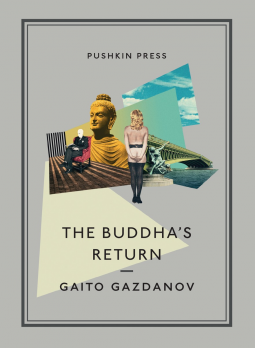
The Buddha's Return
by Gaito Gazdanov
This title was previously available on NetGalley and is now archived.
Send NetGalley books directly to your Kindle or Kindle app
1
To read on a Kindle or Kindle app, please add kindle@netgalley.com as an approved email address to receive files in your Amazon account. Click here for step-by-step instructions.
2
Also find your Kindle email address within your Amazon account, and enter it here.
Pub Date Apr 14 2015 | Archive Date Feb 09 2015
Steerforth Press | Pushkin Collection
Description
In typically crisp, unfussy prose, Gazdanov's delicately balanced novel is an irresistibly hypnotic masterpiece from one of Russia's most talented émigré writers. Slipping between the menacing dream world of the student's fevered imagination, and the dark back alleys of the Paris underworld, The Buddha Returns is part detective novel, part philosophical thriller, and part love story.
Advance Praise
"The Gazdanov revival… is nothing short of a literary event… comparisons to Lermontov, Tolstoy, Dostoevsky, Proust, Celine and Camus… are entirely apt: few authors are able so seamlessly to wed the styles and thematic concerns of the great Russian psychological novelists with those of the French modernists and existentialists… Gazdanov’s thrillers offer a truly original vision, distinguished by profound existential and metaphysical concerns, a peculiar sense of humour, and enchanting prose, which Bryan Karetnyk has once again reproduced with impeccable grace." — Boris Dralyuk, The Times Literary Supplement (UK)
"While Gazdanov seems in thrall to these vastly different novelists, he has his own utterly distinctive voice... vivid sensory detail... transcends the mid-20th-century émigré tradition, and poses prescient questions about the fracturing of identity... deftly translated... Pushkin Press is to be congratulated on reviving an author who is as relevant now as ever. Both these fine novels [The Spectre of Alexander Wolf and The Buddha's Return] offer gripping detective drama, while also engaging with questions of consciousness and self that cannot be resolved by simply foiling a killer." — The Spectator (UK)
Marketing Plan
US-based publicist to cover North American market
Targeted mailing of advance copiesWide mailing of press release
US-based publicist to cover North American market
Targeted mailing of advance copiesWide mailing of press release
Available Editions
| EDITION | Other Format |
| ISBN | 9781782270591 |
| PRICE | $18.00 (USD) |



